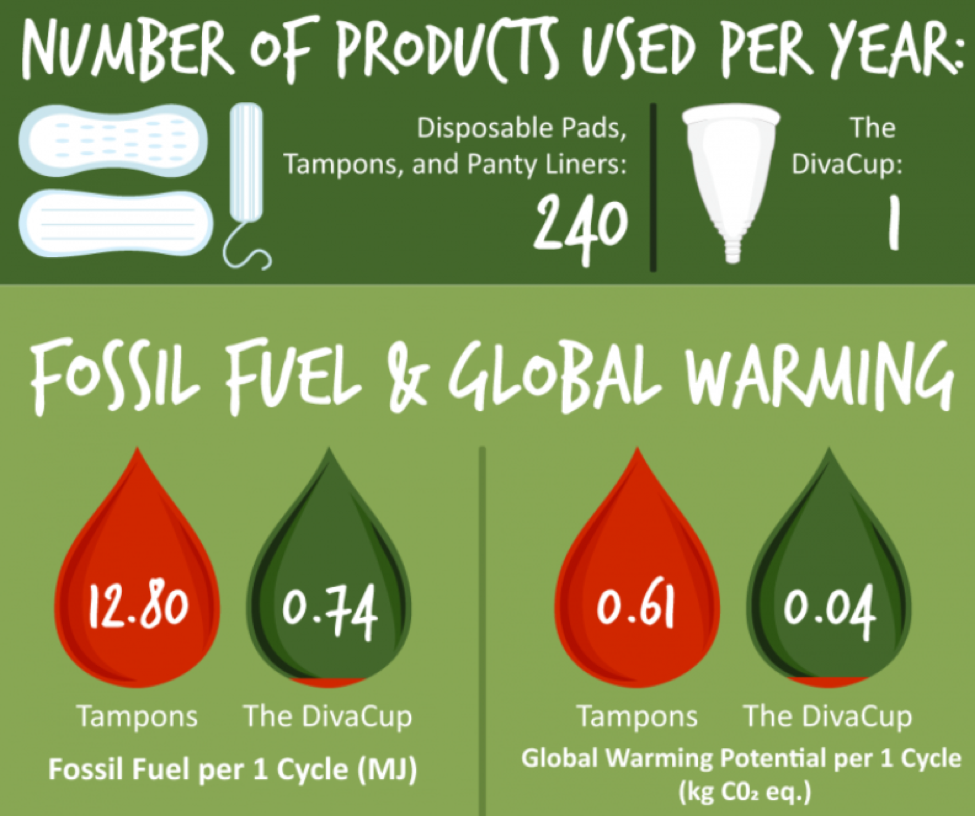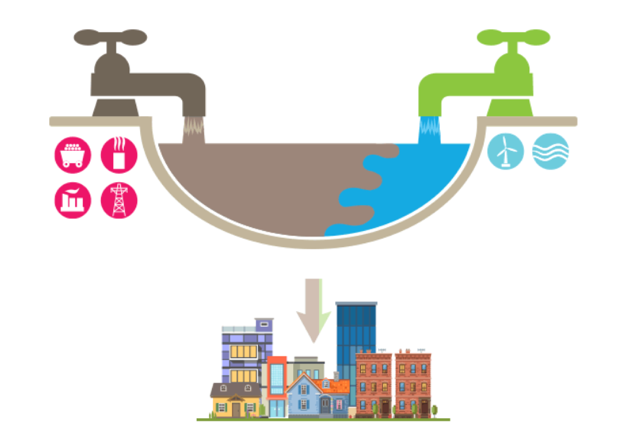Making Periods Greener

Menstruation is a fact of life, but waste doesn’t have to be a part of it.
Can you imagine a world where a company can decrease the amount of non-biodegradable waste entering landfills and waterways by providing a reusable product to replace it? Each year, the average menstruating person uses and disposes of 300-425 disposable pads and/or tampons (containing ingredients such as plastic and rayon that do not break down), and one silicone DivaCup can replace a year’s worth of disposable products per person.
Since 2017, Diva International has sold over 2 million reusable DivaCups worldwide. This has kept 600-850 million pads and tampons from out of landfills, coastlines and waterways.[1]

As Vice President of Operations, I have been instrumental in making sure these reusable products can be made and distributed in a way that maximizes their benefit to the planet. Having a reusable product that can replace thousands of disposables is a great start for the planet, but businesses that produce sustainable products have a responsibility to make their practices as environmentally sound as possible. For consumer packaged goods, this means that sustainability measures must be in place through our supply chain, head office and employee initiatives.
Using Business as a Force for Good
Now, imagine a world where businesses are not only competing to be the best in the world but competing to be the best FOR the world. This is a common theme of Certified B Corporations, and Diva International is honored to be part of this global movement. For many sustainably-minded companies, the B Corp certification is a logical step in setting up environmental goals and accountability measures.
For those who are unfamiliar, certified B Corporations are a new kind of business that balances purpose and profit. Businesses that are B Corp-certified are legally required to consider the impact of their decisions on their workers, customers, suppliers, community and the environment. This is a community of leaders, driving a global movement of people using business as a force for good. This is about building an inclusive and sustainable economy that works for everyone, and it encourages businesses to lay a sustainable, equitable foundation of business practices.
Being a certified B-Corp is not just about the certification, however. It’s about holding ourselves accountable for our environmental initiatives, and continually striving to do better. Since 2017, with our company values of sustainability always guiding what we do, I was able to influence our major suppliers and our assembly and warehouses to make changes to their practices, which have made their operations more sustainable and decreased the environmental impact of producing our product, thereby strengthening the overall benefit of the DivaCup as a reusable product.
By performing regular in-person audits at our suppliers’ facilities, and our own facilities, leaders in consumer packaged goods can ensure that sustainable practices are being followed. And sometimes, those initiatives are simpler than you may think.
For example, some of Diva’s new initiatives since 2017 include:
- Our box printer has made its facility completely free of benzophenone and other chemicals and has completely switched to water and vegetable-based inks for all boxes and inserts.
- Our packaging designers have reduced the size of our transparent window on our packaging to make our boxes fully recyclable.
- Our warehouses have implemented a system and policy in which 100% of all corrugated cardboard and boxboard are recycled.
- Our silicone manufacturing has implemented a more robust silicone-recycling sourcing so that any scrap silicone during equipment set up and the manufacturing process are recycled. The silicone is cracked back and made into silicone oil that is reused in a variety of processes and products, including medical.
Our environmental impact would not be complete if we did not include our head office and our entire team in the impact initiatives. Our DivaCup product, our manufacturing and supply chain initiatives are making a huge impact on diversion of waste to landfills, coastlines and waterways, but the smaller, day-to-day initiatives are also having a huge impact on the way our team of 40 behaves. It’s far easier to make sustainable changes for your business if each member of your team also cares deeply about environmental values. The choices they make on the products they purchase and how they dispose of them is changing. This goes beyond our company walls, and into their personal lives and networks, and I believe it’s important to show staff how their choices at work and home can have a major impact on the environment.
Some of the new initiatives we’ve been able to implement since 2017 for our staff and head office include:
- Creating an internal eco team that has implemented 100% recycling, green waste, compost and technical waste at our office.
- A 90% reduction in office paper use.
- Promoting waste free lunches and meat free lunches.
- Switching to reusable toners in our copy machines.
- Using environmentally friendly cleaning products.
- Installing bike racks and funding public transportation passes for interested staff.
- Partnering with Bullfrog Power and purchasing 100% of our power usage for renewable sources. On average we are supporting and equivalent of over 45 GJ of natural gas a month and 10 MWh of hydro a month in renewable energy sources.

What’s Next?
Although we are doing well, we have a long way to go. There have been many challenges along the way. Some of our challenges have been met, while others will require more thought and innovation.
Our biggest challenge currently is keeping the momentum and enthusiasm going for sustainability-related projects and initiatives for our staff, consumers and supply chain – and this is a common challenge that many businesses face, as sustainable business often requires a paradigm shift in how you think about your relationship to the environment and economy. New policies that make our business practices more sustainable can often be met with resistance or can sink down the priority list in the day-to-day activities of running a business.
Sustainable choices can be more expensive. Return on sustainable investments can take a long time and can be perceived as not worthwhile. When you are working within a limited budget, it is not always looked at as the priority, especially in a growing business. The challenge is to continuously support sustainable choices by providing proof on how the effort and investment is changing the way we do business and the benefits in the long term to our business growth and positive impact on the environment.
People are seeing and experiencing the impact of climate change around the world. Consumers around the world are starting to realize that the product choices they make have an impact on the environment[2]. Consumers are demanding more sustainable products and choices. In particular, Consumer Packaged Goods companies (CPGs) have a responsibility to make and source their current products in a more sustainable way and innovate in such a way that we eliminate products causing harm to the environment. If we do not do this as a company, and as a collective of businesses., we won’t grow, and we won’t survive this changing economy and mindset.
Climate change is happening now; the impact is happening now! This is not the future, it’s today. The big changes that we can impact as business leaders are important. The small changes we can support, educate and make everyone on our planet passionate about will be the changes that will help us all save our planet.
Roxanne Law is VP Operations at Diva International
[1] Based on Diva International Inc. sales data, as well as projections of average disposable product use from DivaBlog: The Environmental Impact of Feminine Hygiene Products.
[2] Nielsen, “How and Why Sustainability is Gaining Momentum with Consumers.”














